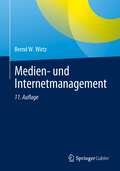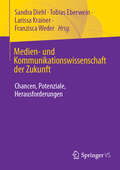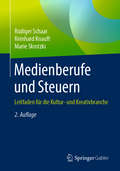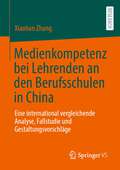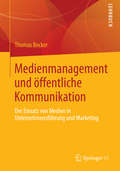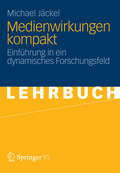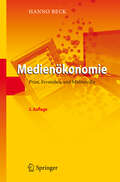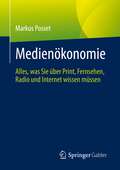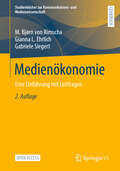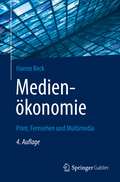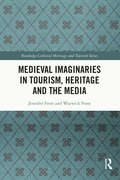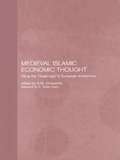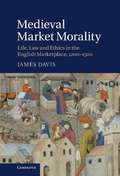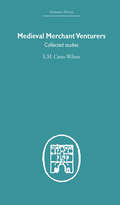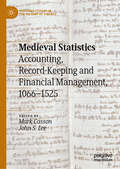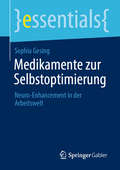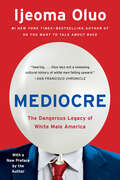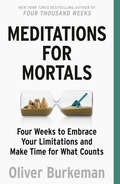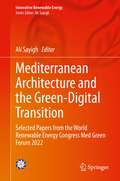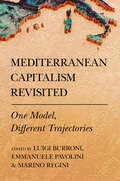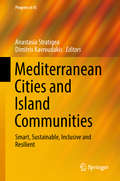- Table View
- List View
Medien- und Internetmanagement
by Bernd W. WirtzDer Medien- und Kommunikationssektor hat sich zu einem zentralen Wirtschaftsbereich in der Informationsgesellschaft entwickelt. Dieses Buch behandelt das Medienmanagement für die elektronischen und printbasierten Medien. Vor dem Hintergrund der Branchenkonvergenz werden die grundlegenden Entwicklungen, Wertschöpfungsstrukturen, Geschäftsmodelle und Wettbewerbsstrategien im Rahmen einer integrierten Managementbetrachtung dargestellt. Darüber hinaus werden neuere Entwicklungen bei Internetmedien behandelt.
Medien- und Kommunikationswissenschaft der Zukunft: Chancen, Potenziale, Herausforderungen
by Larissa Krainer Sandra Diehl Franzisca Weder Tobias EberweinIn einer sich schnell verändernden und immer wieder durch globale Krisen provozierten Medien- und Kommunikationslandschaft sind die medien- und kommunikationswissenschaftlichen Disziplinen herausgefordert, sich mit systemischen, strukturellen und thematischen Transformationsprozessen zu beschäftigen. Insbesondere Medienökonomie, Medienethik und Journalismusforschung bearbeiten aktuelle Probleme und Fragen rund um die technologische Konvergenz der Produktion und die Nutzung von Medien sowie das ökonomische Potenzial und die ethischen Grenzen der Arbeit von Medienunternehmen und des Journalismus. Der Band greift aktuelle Transformationsprozesse auf systemischer und thematischer Ebene auf, widmet sich ethischen Herausforderungen und bezieht epistemologische Veränderungen in der Medien- und Kommunikationswissenschaft mit ein. Er richtet sich damit an Forschende und Studierende in der Medien- und Kommunikationswissenschaft und deren Schwester-Disziplinen wie Wirtschaftswissenschaften, Philosophie oder Nachhaltigkeitsstudien und an Medienpraktiker:innen.
Medien-Frames und ihre Entstehung
by Matthias PotthoffMedien-Frames sind Muster von Aussagen, die in medialen Diskursprodukten wiederholt gemeinsam auftreten. Ihnen wird die Eigenschaft zugesprochen, eine bestimmte Sichtweise zu dem behandelten Thema nahezulegen und Rezipientenmeinungen zu beeinflussen. Matthias Potthoff thematisiert, welche Faktoren einen Einfluss auf die Entstehung von Medien-Frames haben. Dazu präsentiert er ein Modell, das Einflussfaktoren auf Personen-, Organisations- und Länderebene sowie durch Ereignisse entstehende Einflüsse umfasst. Abschließend demonstriert der Autor den Nutzen dieses Modells anhand einer empirischen Fallstudie zum EU-Beitritt der Türkei.
Medienberufe und Steuern: Leitfaden für die Kultur- und Kreativbranche
by Rüdiger Schaar Reinhard Knauft Marie SkrotzkiKünstler und Medienschaffende stehen häufig vor scheinbar unlösbaren Problemen mit dem Finanzamt und im Zusammenhang mit der Künstlersozialkasse. Den Wenigsten gelingt es, im Dschungel aus Gesetzen, Regelungen und Sonderausnahmen den Durchblick zu behalten. In verständlicher Sprache verschafft dieser Leitfaden einen umfassenden Überblick über die Besonderheiten bei der Besteuerung von Medienberufen. Ein praxisnaher und lösungsorientierter Ratgeber für Journalisten, Musiker, Fotografen, Regisseure, Redakteure, Schauspieler und Autoren aus der Film-, Werbe- und Medienbranche sowie ihre Berater.
Medienkompetenz bei Lehrenden an den Berufsschulen in China: Eine international vergleichende Analyse, Fallstudie und Gestaltungsvorschläge
by Xiaohan ZhangIn diesem Band werden Forschungsergebnisse zu schulischer Medienbildung und Medienkompetenz sowie den darauf bezogenen Theorien in China und Deutschland sortiert und zusammengefasst. Als Theorieergänzung werden auch die technische Ausstattung in der Schule, Kenntnisse und Einstellungen sowie Erfahrungen der Lehrer, der Medieneinsatz im Unterricht, der Medienumgang der Schüler, die Lehrerbildung im Medienzusammenhang usw. erläutert. Es wird ein Beitrag zur theoretischen und empirischen Fundierung der medienpädagogischen Kompetenz von Lehrkräften in chinesischen Berufsschulen (mit einer standardisierten Befragung und einem leitfadengestützten Interview als empirischer Teil) geleistet. Abschließend werden Empfehlungen zur Verbesserung der Medienbildung in China und Deutschland gegeben.
Medienmanagement und öffentliche Kommunikation: Der Einsatz von Medien in Unternehmensführung und Marketing
by Thomas BeckerWie setzt man Medien und Kommunikation ein, um unternehmerische Ziele zu erreichen? Das ist das Thema des Fachgebiets Medienmanagement. Im Medienmanagement unterscheidet man zwei Disziplinen: Medien und Kommunikation als Mittel der Unternehmensführung sowie Medien und Kommunikation als strategisches Instrument im Marketing. Beide Aspekte stellt das Lehrbuch Medienmanagement und öffentliche Kommunikation für Studium und Berufspraxis vor und dient damit als Kompass für die Anwendung erfolgreicher Unternehmenskommunikation.
Medienökonomie
by Hanno BeckWer wissen will, wie Medien funktionieren, muss ihre Ökonomie verstehen. Was ist das Besondere an Medien? Welchen ökonomischen Zwängen unterliegen sie? Was wird sich in der Werbebranche durch das Aufkommen des Internets und den Einsatz von Multimediatechniken ändern? Diese und weitere Fragen werden in dem Buch diskutiert. Die Inhalte sind praxisnah und lebendig dargestellt, für die Neuauflage wurden sie aktualisiert.
Medienökonomie: Alles, was Sie über Print, Fernsehen, Radio und Internet wissen müssen
by Markus PossetIn einer Zeit, in der sich die Medien mit einem starken Vertrauensverlust konfrontiert sehen, benötigt es vor allem Aufklärung. Wie funktionieren Medien? Was sind die wirtschaftlichen Abhängigkeiten? Wie entstehen Medieninhalte und wie werden sie konsumiert? Welche Herausforderungen bringt die Digitalisierung und warum ist es heute wichtiger denn je, die Welt der Medien zu verstehen? Es sind Fragen dieser Art, mit denen sich dieses Buch beschäftigt, mit dem Ziel, interessierten Lesern die Funktionsweise der Medien näher zu bringen. Besonders in Bezug auf die sozialen Medien und die Digitalisierung ist das Wissen um die Funktionsweise wichtig – um unterscheiden zu können, welche Medien vertrauenswürdig sind und um zu verstehen, warum der unabhängige Journalismus so wichtig ist. Dieses Buch ist für alle geeignet, die Medien verstehen möchten, und genauso ist es aufbereitet: Für jeden lesbar und verständlich erklärt.
Medienökonomie: Eine Einführung mit Leitfragen (Studienbücher zur Kommunikations- und Medienwissenschaft)
by Gabriele Siegert M. Bjørn von Rimscha Gianna EhrlichAnhand von 13 Leitfragen führt dieses Open-Access-Lehrbuch in die Medienökonomie ein und stellt wesentliche Konzepte und Perspektiven vor. In den Antworten werden die in den Fragen aufgeworfenen Phänomene und Problemstellungen kontextualisiert und die jeweils involvierten Akteure, Theorien und Erklärungen vorgestellt. Die Orientierung an Problemfeldern und Beispielen erleichtert den Zugang zu den zugrunde liegenden theoretischen Konzepten und macht die Medienökonomie als Teilbereich der Publizistik- und Kommunikationswissenschaft greifbar.
Medienökonomie: Print, Fernsehen und Multimedia
by Hanno BeckWer wissen will, wie Medien funktionieren, muss ihre Ökonomie verstehen. Was ist das Besondere an Medien? Welchen ökonomischen Zwängen unterliegen sie? Was wird sich in der Werbebranche durch das Aufkommen des Internets und den Einsatz von Multimediatechniken ändern? Diese und weitere Fragen werden in dem Buch diskutiert. Die Inhalte sind praxisnah und lebendig dargestellt, für die Neuauflage wurden sie aktualisiert.
Medieval Imaginaries in Tourism, Heritage and the Media (Routledge Cultural Heritage and Tourism Series)
by Warwick Frost Jennifer FrostThis book examines the pervading influence of medieval culture, through an exploration of the intersections between tourism, heritage, and imaginaries of the medieval in the media. Drawing on examples from tourist destinations, heritage sites, fictional literature, television and cinema, the book illustrates how the medieval period has consistently captured the imagination of audiences and has been reinvented for contemporary tastes. Chapters present a range of international examples, from nineteenth century Victorian notions of chivalry, knights in shining armour exemplified by King Arthur, and damsels in distress, to the imagining of the Japanese samurai as medieval knights. Other topics explored include the changing representations of medieval women, the Crusades and the Vikings, and the challenges faced by medieval cathedrals to survive economically and socially. This book offers multidisciplinary perspectives and will appeal to scholars and students across a variety of disciplines such as cultural studies, history, tourism, heritage studies, historical geography and sociology.
Medieval Islamic Economic Thought: Filling the Great Gap in European Economics (Routledge Islamic Studies Series)
by S.M. GhazanfarThis book is a collection of papers on the origins of economic thought discovered in the writings of some prominent Islamic scholars, during the five centuries prior to the Latin Scholastics, who include St. Thomas Aquinas. This period of time was labelled by Joseph Schumpeter as representing the 'great gap' in economic history. Unfortunately, this 'gap' is well embedded in most relevant literature. However, during this period the Islamic civilization was one of the most fertile grounds for intellectual developments in various disciplines, including economics, and this book attempts to fill that blind-spot in the history of economic thought.
Medieval Market Morality: Life, Law and Ethics in the English Marketplace, 1200-1500
by James DavisThis important new study examines the market trade of medieval England from a new perspective, by providing a wide-ranging critique of the moral and legal imperatives that underpinned retail trade. James Davis shows how market-goers were influenced not only by practical and economic considerations of price, quality, supply and demand, but also by the moral and cultural environment within which such deals were conducted. This book draws on a broad range of cross-disciplinary evidence, from the literary works of William Langland and the sermons of medieval preachers, to state, civic and guild laws, Davis scrutinises everyday market behaviour through case studies of small and large towns, using the evidence of manor and borough courts. From these varied sources, Davis teases out the complex relationship between morality, law and practice and demonstrates that even the influence of contemporary Christian ideology was not necessarily incompatible with efficient and profitable everyday commerce.
Medieval Merchant Venturers: Collected Studies
by E.M Carus-WilsonFirst published in 1967, this superb collection of essays on trade in the Middle Ages has been a major contribution to modern medieval studies. Professor Carus-Wilson examines: * fifteenth-century Bristol* trade with Iceland* the Merchant Adventurers of London* the thirteenth-century cloth industry (with its highly developed capitalist system)* the export of English woollen cloth* the wine trade. Each paper is firmly rooted in original research and contemporary sources such as customs returns and company minutes, and, in addition, her expose of the dubious accuracy of Aulnage accounts is widely recognised as a classic.
Medieval Statistics: Accounting, Record-Keeping and Financial Management, 1066-1525 (Palgrave Studies in the History of Finance)
by Mark Casson John S. LeeThis book is the first to systematically examine the sources of medieval statistics. It will be useful as a handbook for researchers in financial and cultural history, as a history of financial record-keeping, and as a review of recent research into medieval finance and accounting based on statistical sources.Medieval statistics provide a unique window on the past. Medieval documents produced by royal governments, monastic and ecclesiastical institutions, urban boroughs and legal cases for debt recovery provide a mine of useful information on economic life and financial affairs. They show that medieval administration was far more numerate, and far more sophisticated than is usually recognized. This book provides a comprehensive review of the key sources, written by leading experts in the field. The strengths and weaknesses of each source are reviewed, using original documents for illustration, and discussing examples from the recent literature. The book is mainly concerned with English statistics, as they have survived particularly well in both state and private records, but which showcase the potential of digital technology in enabling systematic study of medieval primary sources where large databases can now be compiled from original manuscripts. This edited volume will be a valuable tool for those working in financial, cultural, and political history, as it seeks to analyse the various ways in which medieval life was documented numerically and the ways in which this information was used within existing power structures.
Medikamente zur Selbstoptimierung: Neuro-Enhancement in der Arbeitswelt (essentials)
by Sophia GesingDieses essential stellt umfassend die aktuellen Erkenntnisse zu Neuro-Enhancement dar. Dieser Begriff beschreibt ein Phänomen der heutigen Arbeitswelt, bei dem Medikamente gezielt zur Selbstoptimierung eingenommen werden. Es werden Bedeutung und Verbreitung von Neuro-Enhancement erörtert, Erklärungsansätze zu den Motiven hinter der Einnahme gegeben sowie die konsumierten Substanzarten näher erläutert. Zudem werden die Wirksamkeit und die Risiken fundiert dargelegt. Eine moralische Bewertungsdiskussion sowie Handlungsempfehlungen und Alternativen zur Einnahme verschreibungspflichtiger Medikamente zur Leistungs- und Wohlbefindenssteigerung runden dieses essential ab.
Mediocre: The Dangerous Legacy of White Male America
by Ijeoma OluoFrom the author of the New York Times bestseller So You Want to Talk About Race, a subversive history of white male American identity.What happens to a country that tells generation after generation of white men that they deserve power? What happens when success is defined by status over women and people of color, instead of by actual accomplishments?Through the last 150 years of American history -- from the post-reconstruction South and the mythic stories of cowboys in the West, to the present-day controversy over NFL protests and the backlash against the rise of women in politics -- Ijeoma Oluo exposes the devastating consequences of white male supremacy on women, people of color, and white men themselves. Mediocre investigates the real costs of this phenomenon in order to imagine a new white male identity, one free from racism and sexism.As provocative as it is essential, this book will upend everything you thought you knew about American identity and offers a bold new vision of American greatness.
Medisys Corp.: The IntensCare Product Development Team
by Joshua D. Margolis Anne DonnellonKey topics include designing teams, managing teams, managing conflict, group dynamics, project management, product development, interdepartmental relations, and organizational change. MediSys, a U.S.-based medical equipment maker, has been developing IntensCare, a new medical system for monitoring intensive-care patients. MediSys has invested heavily in IntensCare, which is eagerly awaited by the market. The product development team, representing several functional areas of the company, has been working on the product for six months but is now running into significant problems with the product design, the schedule, and their own group dynamics. Recently, pressure increased when they learned that two more powerful competitors had begun work on their own products for this market. Several team members are concerned about meeting the team's targets. Struggling especially hard to overcome the various problems is the marketing manager who has profit-and-loss responsibility for IntensCare.
Medisys Corp.: The IntensCare Product Development Team
by Joshua D. Margolis Anne DonnellonKey topics include designing teams, managing teams, managing conflict, group dynamics, project management, product development, interdepartmental relations, and organizational change. MediSys, a U.S.-based medical equipment maker, has been developing IntensCare, a new medical system for monitoring intensive-care patients. MediSys has invested heavily in IntensCare, which is eagerly awaited by the market. The product development team, representing several functional areas of the company, has been working on the product for six months but is now running into significant problems with the product design, the schedule, and their own group dynamics. Recently, pressure increased when they learned that two more powerful competitors had begun work on their own products for this market. Several team members are concerned about meeting the team's targets. Struggling especially hard to overcome the various problems is the marketing manager who has profit-and-loss responsibility for IntensCare.
Meditations for Mortals: Four Weeks to Embrace Your Limitations and Make Time for What Counts
by Oliver BurkemanA map for a liberating journey toward a more meaningful life―a journey that begins where we actually find ourselves, not with a fantasy of where we&’d like to be―from the New York Times bestselling author of Four Thousand WeeksHow would life open up if we stopped treating it as a problem to be solved?Addressing the fundamental questions about how to live, Meditations for Mortals offers a powerful new way to take action on what counts: a guiding philosophy of life Oliver Burkeman calls &“imperfectionism.&” It helps us tackle challenges as they crop up in our daily lives: our finite time, the lure of distraction, the impossibility of doing anything perfectly.How can we embrace our nonnegotiable limitations? Or make good decisions when there&’s always too much to do? How do we shed the illusion that life will really begin as soon as we can &“get on top of everything&”? Reflecting on quotations drawn from philosophy, religion, literature, psychology, and self-help, Burkeman explores a combination of practical tools and daily shifts in perspective. The result is a life-enhancing and surprising challenge to much familiar advice―and a profound yet entertaining crash course in living more fully.
Meditations on Violence: A Comparison of Martial Arts Training & Real World Violence
by Rory MillerA Comparison of Martial Arts Training & Real-World Violence. Experienced martial artist and veteran correction officer Sgt. Rory Miller distills what he has learned from jailhouse brawls, tactical operations and ambushes to explore the differences between martial arts and the subject martial arts were designed to deal with: Violence. In section one, Sgt. Miller introduces the myths, metaphors and expectations that most martial artists have about what they will ultimately learn in their dojo. This is then compared with the complexity of the reality of violence. Complexity is one of the recurring themes throughout this work. Section two examines how to think critically about violence, how to evaluate sources of knowledge and clearly explains the concepts of strategy and tactics. Sections three and four focus on the dynamics of violence itself and the predators who perpetuate it. Drawing on hundreds of encounters and thousands of hours spent with criminals Sgt. Miller explains the types of violence; how, where, when and why it develops; the effects of adrenaline; how criminals think, and even the effects of drugs and altered states of consciousness in a fight. Section five centers on training for violence, and adapting your present training methods to that reality. It discusses the pros and cons of modern and ancient martial arts training and gives a unique insight into early Japanese kata as a military training method. Section six is all about how to make self-defense work. Miller examines how to look at defense in a broader context, and how to overcome some of your own subconscious resistance to meeting violence with violence. The last section deals with the aftermath--the cost of surviving sudden violence or violent environments, how it can change you for good or bad. It gives advice for supervisors and even for instructors on how to help a student/survivor. You'll even learn a bit about enlightenment. Rory Miller has served for seventeen years in corrections as an officer and sergeant working maximum security, booking and mental health; leading a tactical team; and teaching subjects ranging from Defensive Tactics and Use of Force to First Aid and Crisis Communications with the Mentally Ill.
Mediterranean Architecture and the Green-Digital Transition: Selected Papers from the World Renewable Energy Congress Med Green Forum 2022 (Innovative Renewable Energy)
by Ali SayighThis book contains selected papers presented during the World Renewable Energy Network’s biannual World Med Green Forum (MGF). The 2022 MGF highlights the role of renewable energy applications in the sustainable building sector with a focus on the Mediterranean region as a foundation for a truly positive energy future. MGF is an open roundtable for an international community of researchers, practitioners, and experts to discuss the most innovative and promising sustainable building technologies. The papers presented explore the intersection between twin transitions in policies, programs, projects, and experimentation, with the digital domain innovating the green building sector towards more reliable and inclusive planning and design practices in order to collectively envision future buildings and cities.
Mediterranean Capitalism Revisited: One Model, Different Trajectories (Cornell Studies in Political Economy)
by Luigi Burroni, Emmanuele Pavolini, and Marino ReginiMediterranean Capitalism Revisited brings together leading experts on the political economies of southern Europe—specifically Greece, Italy, Spain, and Portugal—to closely analyze and explain the primary socioeconomic and institutional features that define "Mediterranean capitalism" within the wider European context. These economies share a number of features, most notably their difficulties to provide viable answers to the challenge of globalization.By examining and comparing such components as welfare, education and innovation policies, cultural dimensions, and labor market regulation, Mediterranean Capitalism Revisited attends to both commonalities and divergences between the four countries, identifying the main reasons behind the poor performance of their economies and slow recovery from the Great Recession of 2007–2008. This volume also sheds light on the process of diversification among the four countries and addresses whether it did and still does make sense to speak of a uniquely Mediterranean model of capitalism.Contributors: Alexandre Afonso, Leiden University; Lucio Baccaro, Max Planck Institute for the Study of Societies; Rui Branco, NOVA University of Lisbon; Fabio Bulfone, Max Planck Institute for the Study of Societies; Giliberto Capano, University of Bologna; Sabrina Colombo, University of Milan; Lisa Dorigatti, University of Milan; Ana M. Guillén, University of Oviedo; Matteo Jessoula, University of Milan; Andrea Lippi, University of Florence; Manos Matsaganis, Polytechnic University of Milan; Oscar Molina, Autonomous University of Barcelona; Manuela Moschella, Scuola Normale Superiore; Sofia A. Pérez, Boston University; Gemma Scalise, University of Bergamo; Arianna Tassinari, Max Planck Institute for the Study of Societies.
Mediterranean Cities and Island Communities: Smart, Sustainable, Inclusive and Resilient (Progress in IS)
by Anastasia Stratigea Dimitris KavroudakisThis book addresses the issue of smart and sustainable development in the Mediterranean (MED) region, a distinct part of the world, full of challenges and risks but also opportunities. Above all, the book focuses on smartening up small and medium-sized cities and insular communities, taking into account their geographical peculiarities, the pattern of MED urban settlements and the abundance of island complexes in the MED Basin. Taking for granted that sustainability in the MED is the overarching policy goal that needs to be served, the book explores different aspects of smartness in support of this goal’s achievement. In this respect, evidence from concrete smart developments adopted by forerunners in the MED region is collected and analyzed; coupled with experiences gathered from successful, non-MED, examples of smart efforts in European countries. More specifically, current research and empirical results from MED urban environments are discussed, as well as findings from or concerning other parts of the world, which are of relevance to the MED region. The book’s primary goal is to enable policymakers, planners and decision-making bodies to recognize the challenges and options available; and make to more informed policy decisions towards smart, sustainable, inclusive and resilient urban and regional futures in the MED.
